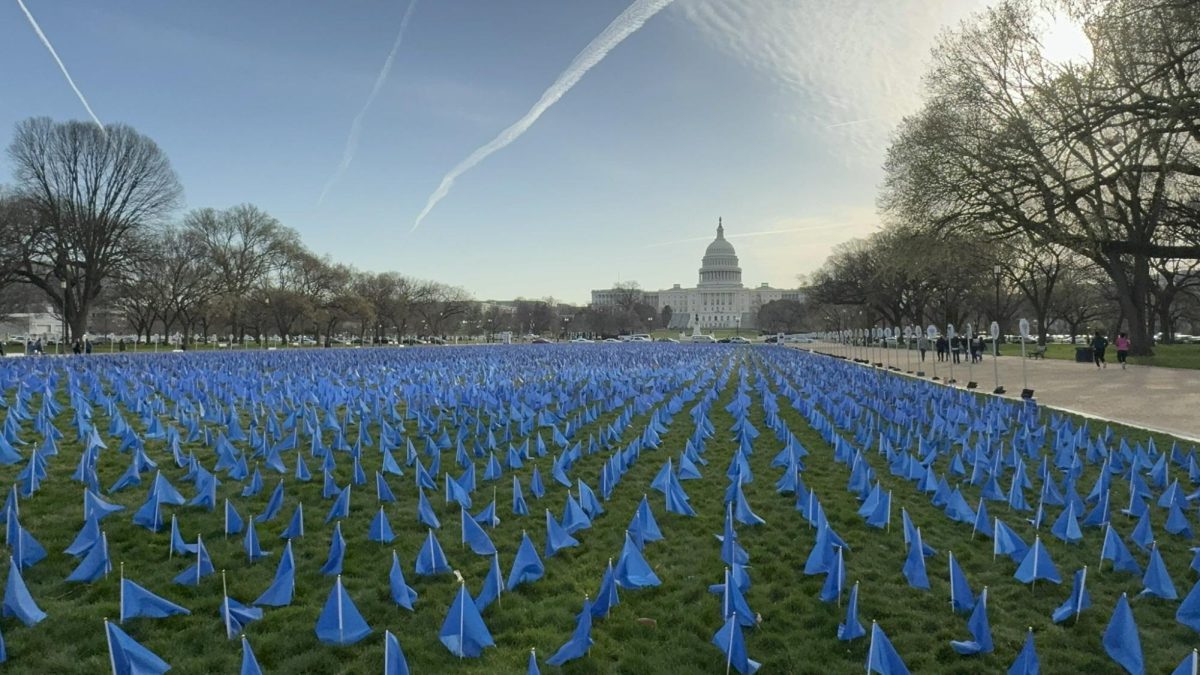The National Mall became a rippling sea of blue — the color of colorectal cancer awareness — when volunteers for the advocacy organization Fight Colorectal Cancer (Fight CRC) planted 27,400 cobalt-colored flags as part of their “United in Blue” installation, March 9.
The flags, which will remain on display between 3rd and 4th St NW until March 22, represent the 27,400 people younger than 50 who are projected to receive a colorectal cancer diagnosis in the year 2030. United in Blue is one of several initiatives put on by Fight CRC in March, recognized as National Colorectal Cancer Awareness Month by the White House.
Molly McDonnell, vice president of advocacy at Fight CRC, said that United in Blue seeks to spotlight growing rates of colorectal cancer among younger people, especially as colorectal cancer is the second leading cause of cancer death among all adults in the United States.
“We designed it really to raise awareness around colorectal cancer broadly, but also around the growing number of young people being diagnosed with colorectal cancer,” McDonnell told The Hoya. “I think there’s, amongst the general public, sort of a belief that colorectal cancer is kind of an old person’s disease, but more and more young people in their twenties, thirties and forties are being diagnosed.”
Since young people often do not discover their cancer until it is too late for treatments to be effective, McDonnell said that Fight CRC has pushed for Congress to fund more accessible, widespread colorectal cancer screening programs.
“On the screening side, we’re advocating for additional funding for the colorectal cancer control program,” McDonnell said. “That’s a program that works with clinics in states across the country to increase colorectal cancer screening rates, particularly in underserved communities.”
Dr. Benjamin Weinberg, an associate professor of medicine and attending physician at Georgetown University School of Medicine and a gastrointestinal oncologist at Lombardi Comprehensive Cancer Center, said that this uptick in early-onset colorectal cancer cases is a relatively recent development.
“It’s been quite surprising that just within the last 25 or so years, since the mid-nineties, we’ve seen this rise in young-onset colorectal cancer, for reasons we don’t fully understand,” Weinberg told The Hoya.
According to Weinberg, the cause of this spike in early-onset colorectal cancer remains something of a mystery. There is a general consensus that environmental factors, rather than inherited genetic mutations, are responsible for the trend, but researchers disagree about the precise culprit.
While some researchers point to obesity or highly-processed diets as key colorectal cancer risk factors, Weinberg said that his research focuses on the relationship between colorectal cancer and the gut microbiome, the communities of bacteria that live in our colon and rectum.
“Our research is interested in the microbiome, which is sort of a hot area of research,” Weinberg said. “The microbes in our guts, some of which we know have associations with the development of colorectal cancer — what role are they playing? Do they place patients at a higher risk of developing colorectal cancer?”
Experts say the colonoscopy — a procedure in which doctors use a small camera to examine the inside of your intestine — is key when it comes to screening for cancerous or precancerous growths in the rectum and colon. The American Cancer Society (ACS) recommends that people at average risk for colorectal cancer get colonoscopies every 10 years, starting at age 45, and those with a family history should start earlier.
Dr. Laura Makaroff, senior vice president for cancer prevention and early detection at the ACS, said in a March 1 press release that people should ask their doctors to check for colorectal cancer if they observe any of the disease’s warning signs, including abdominal pain and blood in their stool, which can also resemble symptoms of other gastrointestinal conditions.
“Many symptoms of colorectal cancer can appear similar to symptoms brought about by other issues, such as infection, hemorrhoids or irritable bowel syndrome,” Makaroff said in the press release.
McDonnell said she hopes that the United in Blue installation, as well as Fight CRC’s March 12 “Call-on Congress” event, which saw colorectal cancer survivors and caregivers rally together on Capitol Hill, will draw support from policymakers for more federally-funded colorectal cancer research going forward.
“Many voices are stronger than one,” McDonnell said. “We take this as an opportunity to be on the front lawn of Congress with this powerful visual but then also go to Capitol Hill with over 200 advocates from across the country to share their stories and say, you know, these are the faces of colorectal cancer.”










